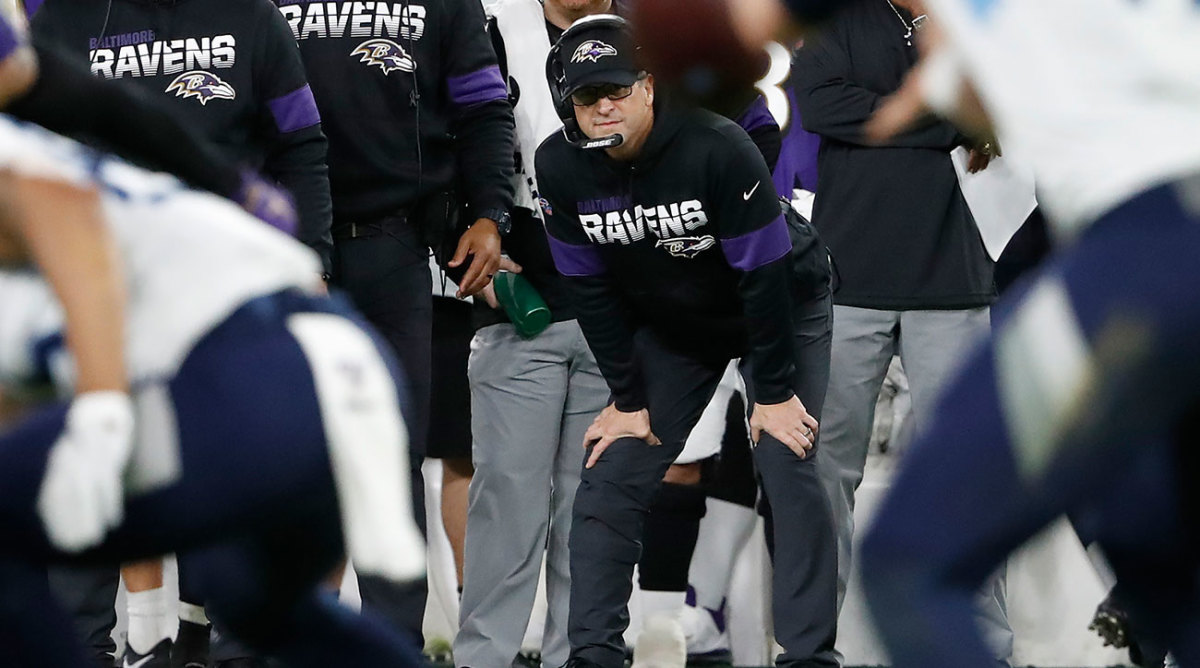In the Ravens-Titans Playoff Rematch, John Harbaugh's Strategy Shouldn't Change
When John Harbaugh leads his Ravens in their playoff rematch against the Titans this weekend, he should think back to the key moments in his team’s stunning defeat last year and remind himself:
I need to do the exact same thing.

Yes. The same thing. You might remember last year’s Ravens-Titans game as the biggest upset of the 2019 postseason. The Ravens had the league’s best record (14–2) and its MVP (Lamar Jackson) but lost to a Titans team that went 9–7. You might remember that Jackson committed three turnovers and Tennessee didn’t commit any.
But it was also the game that would test even the most analytically inclined coach’s belief in percentages. Pretty much every time Harbaugh made the mathematically wise choice, it backfired.
On the first play of the second quarter, down 7–0, Baltimore faced fourth-and-one from its own 45. The NFL’s director of football data and analytics, Mike Lopez, says teams go for it around 51% of the time in that situation. Harbaugh went for it.
Jackson got stopped for no gain, and Tennessee scored a touchdown on the next play.
In its report on the game to coaches around the country, consulting firm Championship Analytics wrote, “This scenario became a theme in this game, as the Ravens made a good decision by going for it on fourth-and-one, but got poor outcomes.”
Later in the quarter, the Ravens faced second-and-goal from the Tennessee four, but the half was ending, so they wisely kicked a field goal to cut the margin to 14–9.
Then, on the first drive of the second half, they faced another fourth-and-one—this time from the Titans’ 18. They were down five.
Now, imagine you are Harbaugh. You have the best team in the league. You have been outgaining Tennessee. You have Justin Tucker, one of the best kickers in NFL history. He can easily cut the lead to two. You have already tried and failed on fourth-and-one once.
But you are one of the more adaptable coaches in the NFL. You have studied the numbers and applied them all year. A lot of coaches in NFL history would automatically kick a field goal here. But the league has gotten wiser; according to Lopez, teams go for it 72% of the time in that situation.
And you know the fact that you failed once should have no bearing on whether you try again.
Harbaugh went for it. Jackson got stopped again.
“Though a FG was likely to be made, needing just a yard, CAI strongly agreed with this choice to go for it,” Championship Analytics wrote.
Tennessee scored again on the next drive. Baltimore, the Super Bowl favorite, suddenly faced a steep climb just to win one playoff game. Then Jackson fumbled and Tennessee scored again to make it 28–6. But it wasn’t over, because the Ravens had Lamar Jackson leading a loaded team. He led them on an 88-yard touchdown drive to make it 28–12.
Harbaugh went for two. “Absolutely the right call,” Championship Analytics wrote, and that one doesn’t need much explaining. But the Ravens failed to convert. Still 28–12.
Baltimore still had time, but its next drive ended with another failed fourth down in Tennessee territory. The Titans won, and the stories of the game would be Tennessee’s stunning month (the Titans had ended Tom Brady’s New England tenure a week earlier) and Jackson’s disappointing outing, which he owned.
Even now, there is a perception that the Ravens failed to show up and the Titans pounded them. But look closer. The Ravens outgained the Titans 530 to 300. Lopez says that since 1981, teams that outgain their opponent by between 220 and 240 yards have won 86.3% of their games. But the Ravens didn’t just lose ... they lost by 16.
How unusual is that? Well, there have been around 10,000 NFL games since 1981, including the postseason. According to Lopez, this was only the second time that a team outgained its opponent by 230 or more yards and lost by at least 16 points. That means there was about a 0.2% chance of this happening.
If Harbaugh had been more conservative, his team might well have won the game. But he still would have been wrong.
This is the hard part of applying analytics. They often defy convention—if the math teaches you something new, then by definition, it is telling you to do something that historically has not been done. Following analytics is actually less risky than being conservative, because every smart analytical decision increases a team’s chances of winning a game. But it does require self-assurance. You have to be willing to be called a fool when you know you aren’t.
Michael McRoberts, the founder of Championship Analytics, says his firm tells head coaches they need to educate their whole teams about these decisions long before they make them. That way, nobody is stunned when they do something that coaches resisted 20 years ago. Going for two and failing can be an emotional letdown, because players feel like they drove all the way down field for seven points and ended up with six. But teams should do it a lot more. They just need to explain why to their players in August, so nobody is surprised in January.
The storyline heading into this weekend’s Titans-Ravens game is different. The Ravens are a wild-card team. Jackson struggled more but then righted himself and played close to his MVP level again. The Titans have been good for two straight years, we now know that Ryan Tannehill was not a one-season fluke and the game is in Tennessee. This is an even matchup.
It could come down to a few high-leverage plays again. Baltimore will need Harbaugh to make the right calls. You know, like he did last year.
